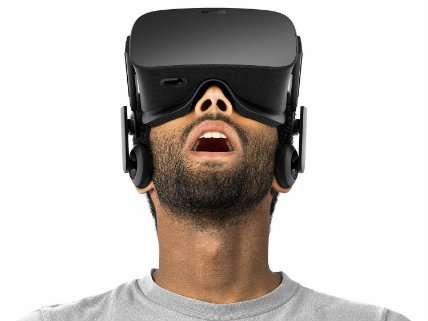Virtual Reality Will Upend the Way We Think About Borders and Immigration Policy
What happens when virtual reality erases national boundaries?

The Oculus Rift, the first of a new generation of consumer virtual reality systems, launched earlier this week to mixed reviews, some of which suggest that it's promising but has a long way to go, others of which say things like "the first time you put it on is the closest thing to real magic you're likely to experience anytime soon."
Either way, though, there seems to be a general, though not universal, sense that the Oculus Rift, and the other VR sets coming in the next few months and years, might—maybe!—herald a kind of technological revolution, albeit one that hasn't arrived quite yet.
Right now, the emphasis in VR development, especially for the rift, seems to be on video games, and I wouldn't be surprised if, over the next decade or so, we'll see video games transition from flat-screen PC and TV experiences to virtual experiences. Video games have increasingly prioritized immersion and visual spectacle over the years (which, of course, sparked a counter-trend of clever smaller-scale games), and it's hard to imagine a better format for the delivery of those sorts of experiences than virtual reality systems that literally block out the sights and sounds of the world around you.
Games are how a lot of us will interact with VR at first, but I think in the longer run, if it's successful, it's going to do a lot more than just make future editions of Fallout more engaging. It's going to change work and human interaction and social organization in all sorts of ways. For example, it has the potential to make a lot of business travel unnecessary: Virtual conferencing rooms could conceivably simulate in-person meetings well enough to eliminate a lot meetings, at least those that don't require hands-on work.
The ability to easily work with people anywhere in the world as if they are in the same room as you will, in turn, challenge a lot of the current thinking about immigration and foreign workers. Over at Slate, Reihan Salam works through some of the potential implications of this, focusing on Microsoft's idea for "holoportation" technology—which allows a virtual image of a person in another location to be projected on top of your current physical environment—using the company's forthcoming augmented-reality device, the Hololens. Here's a snippet from Salam's piece:
VR technology isn't just going to shape the lives of the global jetset. In the years to come, it may well transform our immigration debate. Advocates of large-scale immigration argue that U.S. workers and consumers benefit from it in a number of ways, and they're right. Less-skilled migrant workers often fill jobs that native-born workers would only take on for relatively high wages, thus making a wide array of services more available to working- and middle-class consumers. Skilled immigrant workers, meanwhile, can collaborate with skilled native workers in ways that bring substantial benefits to both.
You can see this changing the immigration policy debate in any number of ways: On the one hand, it could make physical borders seem less relevant than ever. On the other hand, it might provide fuel to restrictionists who argue that physical borders and border controls should be strengthened even as virtual borders disappear. At the same time, it's likely to complicate workplace rules and regulations in all sorts of ways, as previously unknown jurisdictional issues arise.
I don't want to focus too much on this particular branded technology. Microsoft's "holoportation" idea might not work out, or might prove cumbersome and not very useful. All of this technology is still in early stages, of course, and it's always difficult to figure out what widespread adoption will actually look like until it happens. Maybe a hundred years from now, knowledge work will still consist primarily of sitting in front of flat screens, tapping on keyboards and guiding pointers with mice, while scrolling through text on handheld touchscreens.
But I doubt it. and if VR does take off, then it's going to raise these sorts of possibilities and questions about work and borders and immigration and what it means to be a nation, defined in physical, geographic terms, when digital technology has all but erased the concept of distance.


Show Comments (146)